
CHEMICAL JOURNAL OF CHINESE UNIVERSITIES-CHINESE
Scope & Guideline
Empowering Researchers, Transforming Chemistry.
Introduction
Aims and Scopes
- Chemical Synthesis and Catalysis:
The journal covers advanced methods in chemical synthesis, including novel catalytic processes, the development of new catalysts, and the exploration of reaction mechanisms. - Material Science and Nanotechnology:
A significant focus on the synthesis and characterization of nanomaterials, their application in energy storage, catalysis, and environmental remediation. - Analytical Chemistry:
Research articles highlighting innovative analytical techniques, including spectroscopic methods, electrochemical sensors, and separation techniques for detecting and quantifying chemical species. - Biochemistry and Medicinal Chemistry:
The journal includes studies on the synthesis of bioactive compounds, drug design, and the development of therapeutic agents, emphasizing the intersection of chemistry and biology. - Environmental Chemistry:
Research addressing chemical processes in the environment, including pollution, remediation strategies, and the development of sustainable chemical practices. - Computational Chemistry and Theoretical Studies:
Theoretical and computational studies that provide insights into molecular interactions, reaction mechanisms, and properties of materials. - Polymer Chemistry:
Articles related to the synthesis, properties, and applications of polymers, including smart materials and biodegradable plastics.
Trending and Emerging
- Sustainable and Green Chemistry:
An increasing number of articles focus on environmentally friendly processes, including green synthesis methods and the development of biodegradable materials. - Energy Storage and Conversion:
Research related to lithium-ion batteries, supercapacitors, and other energy storage technologies has gained prominence, driven by the global push for renewable energy solutions. - Nanotechnology and Nanomaterials:
Emerging trends in the synthesis and application of nanomaterials for catalysis, drug delivery, and environmental remediation are becoming more prevalent. - Biochemical Applications and Drug Discovery:
There is a growing emphasis on research related to drug design, bioactive compounds, and the role of chemistry in addressing health-related challenges. - Computational and Theoretical Approaches:
An increase in publications utilizing computational methods to predict chemical behavior, optimize materials, and simulate reactions has been noted, reflecting advancements in computational chemistry. - Functional Materials and Smart Polymers:
Research on the development of smart materials with responsive behaviors, including stimuli-responsive polymers and advanced coatings, is trending in the journal.
Declining or Waning
- Traditional Organic Synthesis:
There has been a noticeable decrease in publications focusing solely on traditional organic synthesis methods, likely due to the growing emphasis on greener and more efficient synthetic strategies. - Inorganic Chemistry:
Research specifically centered on classical inorganic compounds and coordination chemistry appears to be declining, possibly as attention shifts towards materials with practical applications in energy and technology. - Classical Analytical Techniques:
There is a waning interest in foundational analytical techniques, such as basic chromatography and titration methods, in favor of more advanced and sensitive analytical approaches. - Basic Theoretical Studies:
While theoretical chemistry remains important, there has been a reduction in purely theoretical studies without experimental validation, as the journal seeks more integrated and application-focused research.
Similar Journals

Canadian Journal of Chemistry
Catalyzing Knowledge in the Heart of CanadaWelcome to the Canadian Journal of Chemistry, a prominent publication dedicated to advancing the study of chemistry through original research and critical reviews. Published by Canadian Science Publishing, this journal has been a cornerstone of chemical research since its inception, covering a broad spectrum of topics within the field, including catalysis, organic chemistry, and general chemistry. With an ISSN of 0008-4042 and E-ISSN of 1480-3291, it provides a vital platform for researchers, professionals, and students to disseminate their findings and engage in scholarly discourse. Impact Factor is currently in development, with the journal classified in the Q4 category for catalysis and Q3 for miscellaneous chemistry fields, signifying its evolving contributions to the scientific community. The journal operates without an open access model, which ensures a rigorous peer-review process while maintaining subscription access for institutions and libraries. Located in Ottawa, Canada, the Canadian Journal of Chemistry continues to provide an invaluable resource for those dedicated to the scientific pursuit of chemistry, making significant strides in fostering interdisciplinary approaches and innovative research methodologies.

Journal of the Iranian Chemical Society
Advancing Chemistry Through Innovative ResearchThe Journal of the Iranian Chemical Society, published by SPRINGER, is a prominent academic journal dedicated to advancing the field of chemistry. With an ISSN of 1735-207X and an E-ISSN of 1735-2428, this quarterly journal has been contributing valuable research from 2006 to 2024. Situated in Germany, it serves as a vital platform for chemists and researchers to disseminate their findings, particularly within the miscellaneous chemistry category, where it ranks in the Q3 quartile for 2023. Despite its current lack of open access options, the journal maintains a solid presence in the academic community, evidenced by its Scopus ranking of #165 out of 408 in general chemistry and a commendable 59th percentile. The journal's objective aims to foster innovation and collaboration in chemical research, making it an essential resource for professionals and students keen on pioneering developments in the field. As a subscriber, you will gain insights into cutting-edge research that drives the future of chemistry.
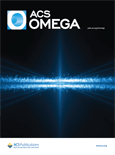
ACS Omega
Unlocking Knowledge, Fueling Innovation in Chemistry.ACS Omega is a prominent open-access journal published by the American Chemical Society that has been serving the global research community since its inception in 2016. With ISSN 2470-1343, it focuses on a wide array of topics within the realm of Chemistry and Chemical Engineering, making it a crucial platform for researchers and practitioners aiming to disseminate significant findings across these disciplines. The journal maintains an impressive standing, ranking in the Q2 quartile for both Chemical Engineering and Chemistry categories, highlighting its impact and relevance in contemporary research. Additionally, with its Scopus ranks placing it within the top 24% and 27% of General Chemistry and General Chemical Engineering respectively, ACS Omega continues to foster innovation and facilitate collaboration among scientists. As an Open Access journal, it ensures that research outputs are freely available to all, enhancing the accessibility and visibility of contributors’ work, thus playing a critical role in advancing scientific knowledge globally from its headquarters in Washington, D.C.

Physical Chemistry Research
Exploring the depths of fluid dynamics and theoretical insights.Physical Chemistry Research, published by the Iranian Chemical Society, is an esteemed academic journal dedicated to advancing knowledge within the fields of *Fluid Flow and Transfer Processes*, *Physical and Theoretical Chemistry*, and *Statistical and Nonlinear Physics*. Since its inception in 2013, the journal has established a crucial platform for researchers, professionals, and students to share innovative findings and methodologies, enhancing collaboration and knowledge dissemination in the physical chemistry community. With impactful contributions recognized in Quartile 3 and Quartile 4 classifications across various categories, the journal is positioned to cultivate emerging research trends as it continues to converge through 2024. Researchers can benefit from diverse perspectives on crucial phenomena in physical chemistry, as the journal is indexed in prominent databases, further increasing accessibility and visibility. The *open access* policy ensures that cutting-edge research remains available to a broad audience, promoting the growth of the discipline globally.
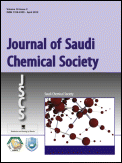
Journal of Saudi Chemical Society
Unveiling the Future of Chemistry with Every Publication.The Journal of Saudi Chemical Society, published by ELSEVIER, stands as a premier platform for advancing knowledge in the field of chemistry. Since its inception in 2009, this Open Access journal has garnered significant attention, securing a prestigious Q1 ranking in the Chemistry (miscellaneous) category for 2023, reflecting its position among the top journals in the discipline. With an impressive Scopus ranking of #66 out of 408 in General Chemistry, this journal boasts a commendable 83rd percentile, underscoring its impact and relevance in the global research community. The journal aims to disseminate high-quality research articles, reviews, and case studies, fostering innovation and collaboration among chemists and allied professionals. By enabling widespread access to cutting-edge research, the Journal of Saudi Chemical Society plays a crucial role in supporting the educational and professional development of students, researchers, and practitioners alike, making it an essential resource for anyone invested in the dynamic field of chemistry.
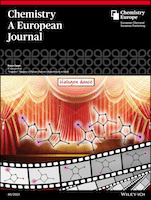
CHEMISTRY-A EUROPEAN JOURNAL
Empowering Discovery in Organic ChemistryCHEMISTRY-A EUROPEAN JOURNAL is a premier academic journal published by WILEY-V C H VERLAG GMBH, specializing in the diverse fields of chemistry and catalysis, with a distinguished focus on organic chemistry. Since its inception in 1995, the journal has established itself as an authoritative resource for researchers and professionals, currently classified in Q1 in Chemistry (miscellaneous) and Organic Chemistry, reflecting its high-quality contributions to the scientific community. With an impressive impact factor and robust Scopus rankings—#33 in Organic Chemistry and #26 in Catalysis—this journal serves as a vital platform for disseminating innovative research findings and critical advancements in chemical sciences. Although not an open-access journal, it provides valuable access options for institutions, ensuring wide reach and engagement within the scientific community. As it converges into 2024, CHEMISTRY-A EUROPEAN JOURNAL remains a key resource for anyone dedicated to advancing the frontiers of chemistry research.
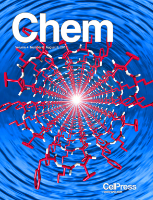
Chem
Unlocking the Secrets of Chemical SciencesChem, published by CELL PRESS, is a renowned academic journal that has rapidly established itself as a leading platform for cutting-edge research in diverse areas such as biochemistry, chemical engineering, materials chemistry, and environmental chemistry. Released under the ISSN 2451-9294, this esteemed journal has achieved an impressive Q1 category ranking across multiple disciplines in 2023, highlighting its significant impact and prominence within the academic community. With a strong focus on innovative studies and interdisciplinary approaches, Chem fosters a vibrant dialogue among researchers, professionals, and students, making it an indispensable resource for those seeking to advance their knowledge and contribute to the evolving field of chemistry. As an open access journal, it aims to democratize knowledge, ensuring that critical research is accessible to a global audience. With its headquarters based in Cambridge, MA, it continues to lead the charge in the dissemination of pivotal findings that shape our understanding of chemical sciences.
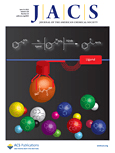
Journal of the American Chemical Society
Fostering Excellence in Chemistry for Over a CenturyJournal of the American Chemical Society (JACS), published by the American Chemical Society, stands as a pivotal publication in the field of chemistry, facilitating the dissemination of significant research findings since its inception in 1879. With an impressive impact factor and esteemed rankings placing it in the Q1 quartile across various categories—including Biochemistry, Catalysis, and Colloid and Surface Chemistry—JACS continues to serve as a vital resource for scientists, professionals, and students alike. Researchers choose JACS for its rigorous peer-review process, ensuring high-quality content that shapes the landscape of modern chemistry. The journal's extensive scope encompasses pivotal advancements and innovative methodologies, reflecting the evolving dynamics of chemical research. With access options being traditional subscription-based, it remains crucial for institutions and individuals to engage with its latest issues to stay at the forefront of chemical science advancement.

RUSSIAN CHEMICAL REVIEWS
Transforming Chemistry Through Rigorous ReviewRUSSIAN CHEMICAL REVIEWS, published by the esteemed ND Zelinsky Institute of Organic Chemistry, RAS, stands as a prominent platform for disseminating high-quality research in the diverse field of chemistry. With an ISSN of 0036-021X and an E-ISSN of 1468-4837, this journal has earned its place in the Q1 quartile of Chemistry (miscellaneous) for 2023, reflecting its outstanding impact and rigorous peer-review process. The journal encompasses a wide array of topics within chemistry, providing critical reviews that advance understanding and foster collaboration among researchers, professionals, and students globally. With its consistent publication since 1970, RUSSIAN CHEMICAL REVIEWS not only serves as a valuable resource for the latest advancements in the field but also plays a crucial role in shaping future research directions. The journal is based in the Russian Federation, with its office located at 47 Leninsky Pr, Moscow 119991, RUSSIA. As an essential reference for those in the chemical sciences, it provides an ideal avenue for authors looking to publish impactful reviews that contribute to the broader scientific community.

Chemical Methodologies
Unlocking the Potential of Chemical MethodologiesWelcome to Chemical Methodologies, a premier journal published by SAMI PUBLISHING CO-SPC, dedicated to advancing the field of chemistry through innovative research and methodologies. With an ISSN of 2645-7776 and an E-ISSN of 2588-4344, this journal provides a vital platform for researchers and scholars to share their findings in areas encompassing physical, theoretical, and organic chemistry. Despite its initial HIndex and quartile rankings still being established, the journal's evolving impact within the academic landscape is underscored by its Scopus Ranks, which place it in the 35th percentile for physical and theoretical chemistry and the 33rd percentile for organic chemistry. Since its inception in 2022, and continuing through 2024, Chemical Methodologies aims to foster collaboration and knowledge dissemination among academics and practitioners alike, bridging theoretical concepts and practical applications. This open-access platform enhances accessibility for researchers and students worldwide, ensuring that groundbreaking contributions to chemical science reach a broad audience.